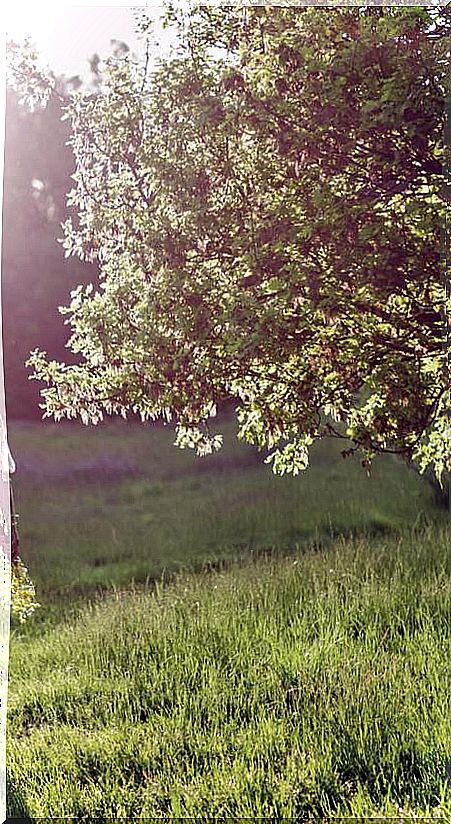You Need Time To Be Alone!
We need introspection to get to know each other better. When loneliness is used to promote an encounter with oneself, it can bring out unsuspected capacities.

Try to remember: when was the last time you spent 24 hours alone ? I asked myself the question while preparing this article and did not know what to answer. I did not remember it. A long time without a doubt. And yet years ago I used to do it.
I would spend a whole day wasted walking trails or a couple of days wandering somewhere new or barely known, with nothing concrete to do or see, leaving my mind wandering without a precise idea. Just for the pleasure of “finding me again.”
And I remember that many times I had to justify those solo escapades, as if there was something problematic or unhealthy about it, although I always came back with “charged batteries” and a clearer vision of what to do when something worried me.
Loneliness can be your ally
Would I have achieved the same result or even a better one if these “escapades” had been accompanied? Maybe. But today studies support that loneliness is a healthy tonic, an energizer of the senses and potentialities. Although there are obviously different types of loneliness.
Voluntary is not the same as that derived from isolation or situations that we cannot control, such as the separation or death of a loved one, or that imposed by physical limitations. But all of them can become a transforming loneliness if used to look within and create a space for healing or improvement.
Modern psychology, however, has struggled to see the bright side of loneliness. He has placed great emphasis on the fact that the main source of happiness is relationships with others, if not even the only one, especially since the English psychoanalyst John Bowlby developed the attachment theory in the 1960s .
In this attachment theory, Bowlby established that the first need of human beings from birth is to have satisfactory supportive relationships with other people.
The social psychologist and humanist Erich Fromm said something similar in a more literary and existential way: “You are born alone and you die alone, and in the parenthesis the loneliness is so great that you need to share your life to forget it.”
Look inside
We certainly need the company of others because ” we are social animals”, as the Roman emperor and philosopher Marcus Aurelius put it almost two thousand years ago.
But it is possible that this emphasis on sociability and the fear generated to loneliness have made it difficult to value something no less primordial and valuable: that our well-being or happiness also depends on what happens inside us when we are alone.
The latter was written in 1988 by Anthony Storr in his book Soledad (Debate, 2001) and completed it by saying that accepting loneliness and living it is a criterion of emotional maturity as significant as the ability to create emotional bonds with others on equal terms.
Connect with your own wants and needs
The English psychiatrist defended that only when the child experiences the sensation of being alone happy and relaxed, first with his mother and then without her, can he be really sure of his ability to discover what he really wants or needs, regardless of what they others can expect from it or deposit in it.
Storr thus links loneliness to self-discovery and self-understanding, to becoming aware of one’s deepest needs, feelings and impulses. Or what is the same, Storr believes that without being fully assumed in solitude, maturation, growth is impossible.
Loneliness in determining phases of life
It occurs at any age, but especially when we are in transition phases or on the verge of a change in fitness.
An example is in adolescence, when the body is already pulling hard towards physical maturity and all kinds of contradictions and unknowns are bubbling in the head that make adolescents withdraw into themselves. At that age, loneliness helps to forge a clearer identity, achieve goals and develop creative thinking.
Loneliness would be a fertilizer: if there are seeds, it makes them grow. As Storr recalls, the great religious leaders: Moses, Buddha, Jesus… they separated themselves from the world and found their enlightenment, their message, in solitude.
The greatest creators, to whom he dedicated a large part of his study: Bach, Kant, Beethoven, Goya, Wittgenstein… they conceived the essence of their works after long meditative retreats. They are lofty examples, but the fertilizing potential of loneliness is there, within everyone’s reach.
The empty loneliness
What would Anthony Storr say today, when so many people establish links through all kinds of social networks, multiply their relationships at the click of a button and expose their intimacies without seeming to save something for inner maturation?
What would you say about a time when the distinction between being alone and with someone has become blurred because gadgets leave us permanently available to others?
He would surely see in this one more sample of the contradictory condition of the human being : a unique being from birth to death and with an enormous capacity to communicate with others, but not unlimited, because there is always an untransferable embers, and therefore a being doomed to an intimate solitude, although in need of company to “complete”, to be.
It is an insurmountable contradiction, no matter how much technology we put into our lives and how many relationships we establish: we will never fully fill the existential loneliness that characterizes us.
In fact, this feeling of loneliness seems to have multiplied in parallel with the possibilities of communication, as if this increasing capacity – which leads to extending our presence, even if it is virtual, to the entire planet – instead of resulting in more and better relationships delve into isolation.
Quantity is not always quality
This growing feeling of loneliness in the midst of the richness of communication comes from some deficiencies that we do not know how to fill.
It is an empty solitude, and therefore feared and rejected, the same one that the dictionary defines as “the voluntary or involuntary lack of company” or a “deserted place”, and that reminds me of Caligula’s solitude in the play by Albert Camus : “Ah, if only instead of that poisoned loneliness of presences that is mine, I could enjoy the real one, the silence and the trembling of a tree!”.
The answer to empty loneliness does not lie in filling it with noise or agitation. Not even inventing palliatives like that of that Japanese restaurant that became fashionable a couple of years ago and that apparently already has several open establishments, the Moomin House Cafe, which sits a stuffed animal at the table of lonely diners so that they feel accompanied. A childish response to a deep and real fear that must be faced today.
In other centuries, loneliness was not even defined as the lack of something, but was conceived as the encounter with oneself and was considered a way to approach transcendence through isolation and prayer.
Loneliness was, and still is if we seek it that way, an opportunity to look into our inner darkness. A source of strength, an antidote to isolation and alienation from oneself, according to the Canadian clinical psychologist Jules Bureau, who considers it a means and not an end in itself and uses it as a therapeutic resource.
Fuel for life
Even the loneliness imposed by external events, painful, can be a springboard to find a way out and rise beyond the present. It is often the best way to defend and protect oneself, as in mourning, says Bureau, although today those who are going through this difficult trance are advised to maintain their activity, not to stop or be left alone, when perhaps it would be better to assume it and adapt to it.
Loneliness, in that sense, according to the psychologist Ester Buchholz, is an essential means to regulate and adjust our lives and a means to understand the real needs we have and how to satisfy them. The time we spend alone, voluntarily and consciously, is never wasted time, but rather food, it is fuel for life.
Loneliness is an opportunity
There are many other positive aspects of loneliness. For example, a study carried out at the North American University of Harvard found that we form the most lasting and precise memories when we are alone, because we focus more attention and we do not function in a “multitasking” mode as we do when we are with other people. And in another study it was found that loneliness improves the perception of things : it sharpens our senses.
We can describe 4 qualities that can improve with loneliness:
- Empathy: not being in a permanent disposition for others, taking a break from time to time, improves the acceptance of others and therefore relationships.
- Creativity: the mind wanders in solitude, and this withdrawal enhances the process of thinking critically and reflectively; makes us go further.
- The renewal: in solitude, the social character that is incarnated loses solidity and it is discovered that one is not identical to the conception that one has of himself.
- Consciousness: by accepting loneliness we give more space to our subjectivity and expand the territory of our consciousness.
Conquer personal freedom
But the most important thing, I think, is what the great French humanist Michel de Montaigne said: in it we find that “back room of ours” where we can fix our true freedom and where we can live for ourselves.
Only in this way, masters of ourselves, can we then go out fully to meet others. Only in this way can we avoid falling into the worst form of loneliness: discontent with oneself and the inability to enjoy life.
Loneliness can occur in an isolated place or in the middle of the city. It is a “mood”, a voluntary respite and a way to accept it. We can schedule a day without leaving home, with music as company; take a good walk; go into a church for a while; or create rituals of disconnection, doing nothing: Sunday morning, the afternoon tea ceremony …









